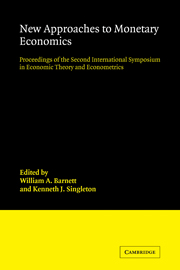 New Approaches to Monetary Economics
New Approaches to Monetary Economics Book contents
- Frontmatter
- Contents
- Editors' introduction
- List of contributors
- Part I Transactions motivated monetary holdings in general equilibrium
- Part II Financial intermediation
- Part III Monetary aggregation theory
- Part IV Issues on aggregate fluctuations
- 12 Asset prices in a time-series model with disparately informed, competitive traders
- 13 Nominal surprises, real factors, and propagation mechanisms
- 14 A rational expectations framework for short-run policy analysis
- Part V Theoretical issues in the foundations of monetary economics and macroeconomics
14 - A rational expectations framework for short-run policy analysis
Published online by Cambridge University Press: 04 August 2010
- Frontmatter
- Contents
- Editors' introduction
- List of contributors
- Part I Transactions motivated monetary holdings in general equilibrium
- Part II Financial intermediation
- Part III Monetary aggregation theory
- Part IV Issues on aggregate fluctuations
- 12 Asset prices in a time-series model with disparately informed, competitive traders
- 13 Nominal surprises, real factors, and propagation mechanisms
- 14 A rational expectations framework for short-run policy analysis
- Part V Theoretical issues in the foundations of monetary economics and macroeconomics
Summary
Introduction
There is increasing recognition that Lucas's (1976) critique of econometric policy evaluation, at least under its usual interpretation, is logically flawed. The point has been forcefully made recently by Sargent (1984) and by Cooley, Leroy, and Rahman (1984) (henceforth referred to as CLR), as well as in my own paper (1982). The problem is that if the parameters of the policy “rule” are subject to change, as they must be if it makes sense to evaluate changes in them, then the public must recognize this fact and have a probability distribution over the parameters of the rule. But then these parameters are themselves policy variables, taking on a time series of values drawn from some probability law. Predicting how the economy will behave if we set the parameters of the rule at some value and keep them there is logically equivalent to predicting the behavior of the economy conditional on a certain path of a policy variable. Yet this is just the kind of exercise that Lucas claimed to be meaningless.
It is also evident that the methods of policy evaluation that Lucas criticized are still in wide use nine years after the appearance of his paper. During discussions of monetary and fiscal policy, statistical models prepared by the Congressional Budget Office, the Federal Reserve Board, numerous other agencies, and by private entities are used to prepare predictions of the likely future path of the economy, conditional on various possible paths for policy variables.
- Type
- Chapter
- Information
- New Approaches to Monetary EconomicsProceedings of the Second International Symposium in Economic Theory and Econometrics, pp. 293 - 308Publisher: Cambridge University PressPrint publication year: 1987
- 20
- Cited by


